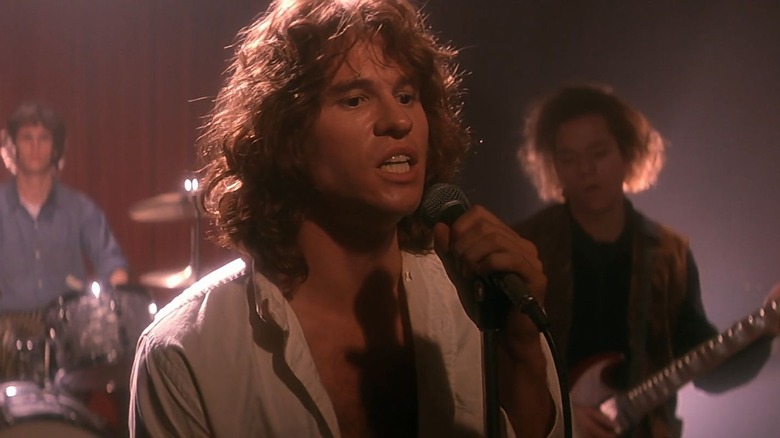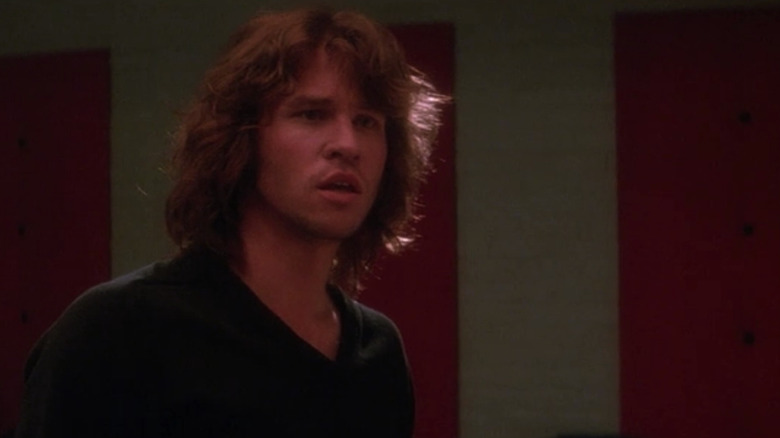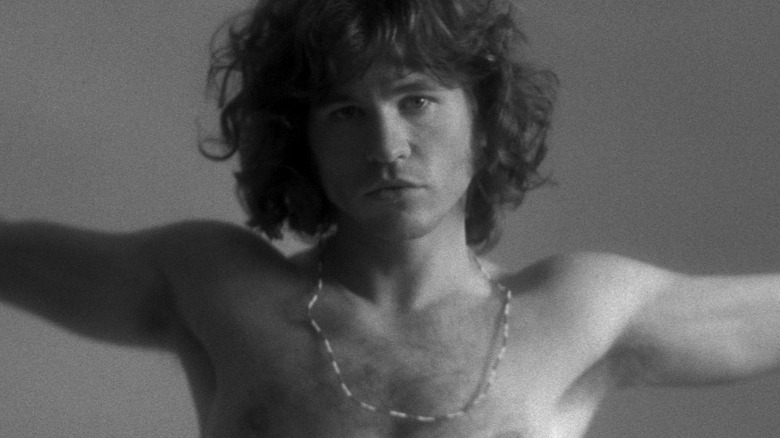Val Kilmer Didn't Have Much Time To Be Himself While Working On Oliver Stone's The Doors
Oliver Stone was born in 1946. Jim Morrison was born in 1943. Stone was 19 when The Doors first formed in 1965. Morrison was 22. By 1991, a 45-year-old Stone had established himself as a notable and hard-striking American Boomer auteur with films like "Platoon," "Wall Street," and "Born on the Fourth of July." By 1991, Morrison had been dead for 20 years.
Stone's wild, drug-soaked biopic "The Doors" was released to modest success and a warm critical response (the film currently holds a mere 57% approval rating on Rotten Tomatoes). Using multiple film formats and a freewheeling narrative, "The Doors" certainly captured the sweaty, drugged-out experience of attending a concert in the late 1960s, but didn't offer too much beyond the death wish-inflected arc possessed by the band's doomed lead singer.
Morrison was played by Val Kilmer, a rising star at the time with comedy hits like "Top Secret!" and "Real Genius," as well as blockbusters like "Top Gun" and "Willow," already under his belt. "The Doors," as this young viewer recalls, was Kilmer's first proper cinematic acting showcase outside of comedy and genre films, and the actor certainly proved himself to the world. Kilmer's performance is intense and dedicated.
In a 2017 interview with the Guardian, Kilmer revealed that he had to dedicate himself to playing Morrison, as Stone was a grueling (but fair) director, and that the shooting schedule was so quick, he rarely had a moment when he could drop character. Kilmer is no Method actor, but he kind of was by default on "The Doors."
Kilmer's reputation
For many years, Kilmer had a reputation — largely unfounded — of being difficult to work with. These rumors reached my own ears during the production of John Frankenheimer's 1996 remake of "The Island of Dr. Moreau," which was an infamously troubled production. Richard Stanley had already directed much of that film before being replaced. Kilmer, rumor had it, bickered with the new director. In the documentary film "Val," Kilmer also admitted that working on "Batman Forever" was a miserable experience, largely because of the costume; movement was difficult and his ears were covered.
Kilmer posits that his bad reputation probably started with "The Doors," a movie that required not just some pretty intense acting, but also learning to sing like Morrison. According to Kilmer, the rehearsal process involved a lot of spitballing, and the actor had to just keep on playing the part all day long. When asked about the rumors, Kilmer was frank, saying:
"I guess it started around 'The Doors' [...]. I was trying to do something very challenging, in addition to just being faithful to the character and to Oliver Stone, who is amazing and amazingly tough. So on top of those two heavy shadows, I was trying to sing all the songs live! Which was a massive undertaking, and we did it, but in order to hold the fort I didn't afford myself much time to 'be me.'" So we would improv a lot and I just started calling [the actors] by their [characters'] names, and people started saying I was insisting on being called the character."
Anyone who has acted before knows the common practice of referring to actors by their character names on set. It's not the Method. It's just shorthand. Kilmer, somehow, got pegged as practicing the former.
Kilmer did not insist on being called Jim
Kilmer was happy to set the record straight. He never insisted on being called "Jim." He said it "wasn't true," continuing, "But maybe from there an idea developed that I was too demanding about acting standards."
Once again, looking at Ting Poo's and Leo Scott's 2021 biographical documentary "Val," Kilmer certainly took his craft seriously, but he was never one to make unreasonable demands. Indeed, Kilmer was just as aware of his station in pop culture as he was his skill as an actor, often eyeballing well-paying commercial projects.
An early success in a mega-hit like "Top Gun" most assuredly changed his way of thinking, and he always sought films that would serve his need to say something of substance while still gathering a large commercial audience. Some of the man's fans might wince when he refers to a work of utter brilliance like "Top Secret!" as mere "fluff." Excuse me, Mr. Kilmer, but "Top Secret!" is a work of genius.
Kilmer remained self-aware, but humble, saying, "I'm sure I could've been more diplomatic but all I've ever tried to do is deserve the privilege of being able to entertain for a living."


